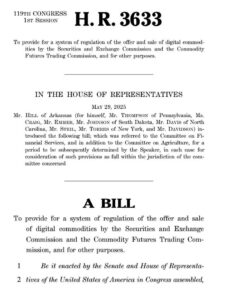✅ What Just Happened?
In a landmark move for cryptocurrency regulation, the U.S. House Committee on Financial Services passed the CLARITY Act with a 32–19 vote, advancing the bill to the full House of Representatives for a potential floor vote.
This comes just days after the House Agriculture Committee approved the same legislation by a resounding 47–6 margin, fulfilling the requirement for dual-committee approval in areas of shared jurisdiction over digital assets.
💡 What Is the CLARITY Act?
The CLARITY Act (H.R. 3633) — short for “Crypto Legal and Regulatory Advancements to Improve Transparency for You” — is designed to establish clear rules for digital assets in the U.S., a space that’s long been mired in uncertainty and enforcement-heavy oversight.

🧩 Key Components:
- Clear Classification System
- Distinguishes between digital commodities and digital securities.
- Assets with sufficient decentralization would fall under CFTC oversight (commodities), not SEC.
- Issuer Disclosures
- Requires detailed disclosures from token issuers to promote investor transparency.
- Regulatory Clarity for Developers
- Open-source developers and miners would be protected from SEC enforcement unless acting as intermediaries.
- Path to Compliance
- Provides a structured, time-bound process for digital asset companies to register with appropriate federal agencies.
🔍 Why It Matters: The Fight for Regulatory Clarity
The crypto industry has long argued that the lack of clear regulations is stifling innovation and pushing businesses offshore. Until now, most guidance has come in the form of SEC enforcement actions or ambiguous legal memos.
With the CLARITY Act:
✅ Innovators get rules.
✅ Investors get protection.
✅ Agencies get jurisdiction defined.
This is a major step in transitioning U.S. crypto policy from regulation by enforcement to regulation by legislation.
⚖️ Political Divide: Who Voted How?
- ✅ Supporters: Mostly Republicans and moderate Democrats supportive of fintech innovation.
- ❌ Opponents: Some Democrats warned the bill weakens the SEC’s investor protections and could “legitimize risky assets.”
Rep. Patrick McHenry (R-NC), Chair of the Financial Services Committee, called it:
“A strong step toward a functional, fair, and innovation-friendly crypto framework in the United States.”
📈 What’s Next?
The bill now heads to the House floor for a full vote — possibly within weeks.
- If passed, it would proceed to the Senate, where companion legislation is still under development.
- A favorable Senate vote would push the bill to President Biden’s desk for final approval.
🌎 How Will This Affect Crypto Markets?
The CLARITY Act may lead to:
✅ Increased institutional confidence
✅ Domestic crypto growth (instead of offshoring)
✅ Improved transparency in token launches
✅ A rally in U.S.-based crypto stocks and blockchain firms
💬 Industry Reactions
Coinbase, Ripple, and Circle have applauded the move, calling it “the beginning of a new era” for American crypto regulation.
💬 “This is the clarity we’ve needed for years,” said a Circle spokesperson.
However, some consumer protection groups remain cautious, urging lawmakers to strengthen investor safeguards before final passage.
🔚 Final Thoughts
The passage of the CLARITY Act by the House Financial Services Committee is a watershed moment for crypto in the U.S. It signals that Washington is finally getting serious about regulating — not banning — blockchain innovation.
While challenges remain, one thing is clear: the regulatory fog is starting to lift. 🌤️




































